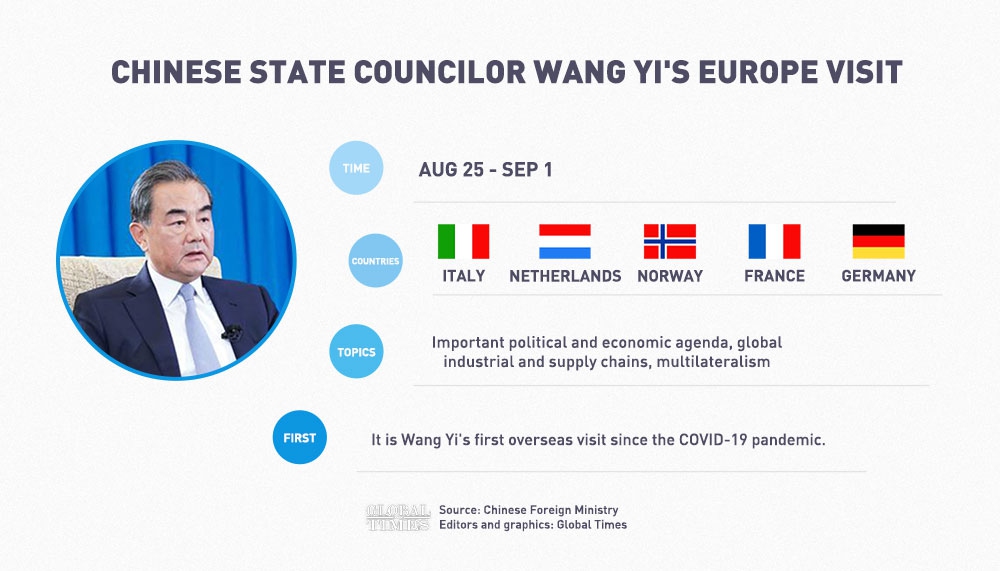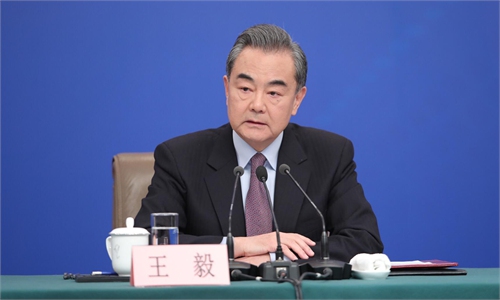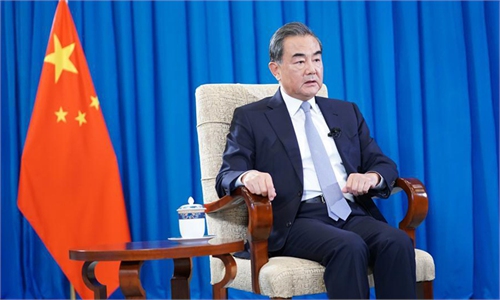
Wang Yi Europe visit
Chinese State Councilor and Foreign Minister Wang Yi is scheduled to visit Italy, the Netherlands, Norway, France and Germany from Tuesday to September 1. It marks China's first high-level overseas visit by officials since COVID-19 was put under control in China. It vividly illustrates the importance of Europe to China's diplomacy.
China and Europe have been interacting frequently since the pandemic broke out. Both sides have given each other strong support, upheld frequent high-level interactions, shared experiences, and provided medical supplies and assistance to fight the scourge of this virus. Although there is discord between the two sides, including queries over the so-called mask diplomacy and cultural discrimination, as well as pressures from the US, China-Europe relations in general are committed to the fundamentals of win-win cooperation for the following reasons.
First, China and Europe face the common challenge of the international order's decline. Under the "American First" doctrine, the Trump administration has brought a tendency of unilateralism and isolationism. This began with the US' withdrawal from the Trans-Pacific Partnership agreement, the Paris Agreement on climate change, the UNESCO, and the Iran nuclear agreement. This brought uncertainty to the international landscape and risks to international order. In addition, as the pandemic has further impacted trans-Atlantic trade and security cooperation, the US has accelerated the economic and geo-strategic competitions with China. As important pillars of the multi-polar world, China and Europe share responsibility to promote multilateralism and resist unilateralism.
Second, both China and Europe are committed to improving the existing international order. China rises within the existing international order, of which Europe is a key supporter. What's more, both sides promote diversity of civilization, globalization and multilateralism. On the one hand, China and Europe are complementary in many aspects in the face of increasingly serious global issues. Their mutually beneficial cooperation can reduce governance costs while promote collaborative development. On the other hand, China's vision of building a community of shared future for mankind and EU's insistence of multilateralism share the same pursuit of global governance. Both sides are important forces for promoting world multi-polarization and global governance.
Third, multilateralism and free trade have become the common language of China and Europe. The two sides' economic and trade cooperation enjoys broad prospects and great potential. In this case, China and Europe have formed huge common interests and become increasingly interdependent. This stands in contrast to the US' unilateralism and protectionism, which is clearly disappointing to the world. Washington's moves will greatly reduce the influence of the US in regards to international rules and weaken its international leadership. Given that the European Union is a major driver of global trade and investment and that emerging economies like China are becoming more influential economically, both the bloc and China need an inclusive, open and rules-based economic system. Through multilateral cooperation, China and Europe can promote and lead a new round of globalization, providing more global public goods for the benefit of people around the world.
China has always emphasized that cooperation between China and Europe far outweighs competition. And it is clear to all that China is building a more peaceful, secure, fair and inclusive world through extensive consultations, joint contributions, and win-win solutions. However, the pandemic and the external intervention of the US have posed new challenges to China-Europe relations by inflaming previous prejudices and newly emerged misunderstandings. This has led to some changes to the EU's policy toward China - ranging from constructive and comprehensive engagement to maintaining an economic and political balance.
The best way for China-Europe relations is to move from a community of shared interests to a community of shared responsibilities and finally to a community with shared future. Both sides' pursuit of the values of global governance, especially the maintenance and development of multilateralism, reflects their vision to reshape the international order.
The author is a research fellow with the Institute of European Studies, Chinese Academy of Social Sciences. opinion@globaltimes.com.cn


